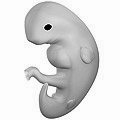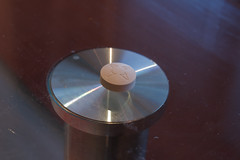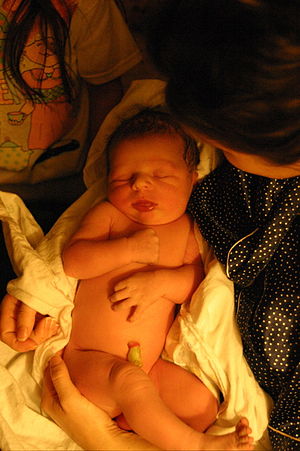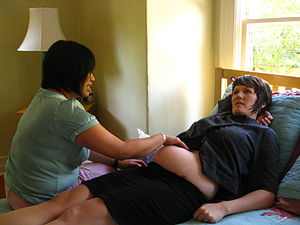 |
| Human embryo at six weeks gestational age (Photo credit: Wikipedia) |
Fetal personhood doesn't just affect women who choose abortion. It is a threat to all pregnant women because it puts their bodies at the mercy of medical and legal interpretation. It is based on the overwhelmingly false assumption that a pregnant woman will not make the best decisions for her unborn child. A woman and her fetus are in it together for however long the pregnancy lasts. Putting the rights of a fetus in the hands of anyone other than the pregnant woman can only serve to cause needless pain. To illustrate this point, I will share two very difficult private moments in my life that could have been made far more painful by fetal personhood.
A few years ago, I was treated for hyperthyroidism caused by autoimmunity. I didn't do so well on the medication so I didn't refill the prescription and was still trying to consider my treatment options. Unexpectedly, I turned up pregnant. I had had negative experiences with both the endocrinologist and nurse midwife I had most recently seen so I didn't know who to call for thyroid testing and treatment. I wasn't even ready to tell my husband the news when the gush of blood and tiny barely distinguishable fetus came a few days later. I cried and cried along with my husband. I blamed myself. If only my thyroid levels had been closer to normal, maybe the miscarriage wouldn't have happened (of course there's no way to say for sure that that was the reason for the loss).
The point is I went against doctor's orders and lost a pregnancy. Under fetal personhood laws that could have easily been construed as a crime resulting in jail time and a criminal record. Think that's a far fetched notion? Just read the news.
Mississippi Could Soon Jail Women for Stillbirths, Miscarriages
Women Jailed for Miscarriages in El Salvador
The other situation was when I was in labor with my third child and having a very ugly argument with the nurse-midwife. My water broke during early labor and progress towards birth was going slow. After having suffered two traumatic (and unnecessary) pitocin augmented labors, I refused to allow pitocin, which would have restricted me to bed with IV and continuous monitor hooked up which meant no way to handle stronger contractions and the calm natural birth I was working so hard for would be gone. The nurse midwife said my baby would be born septic and die. I still refused. (Ultimately I left that hospital, but still didn't have the birth I was going for because I was given cytotec, which is also sometimes used in medical abortions. There never was any hint of infection.)
What if the nurse-midwife and staff obstetrician (who I never saw) could have gotten a legal order to protect my unborn baby by whatever means necessary? Would I have been chained to the bed? Would they have sedated me or simply let me scream in terror? Would they have rushed me to the operating room for needless major surgery? Think that would never happen. Again, read the news.
Woman Ordered by State to Submit to Hospital Confinement, Cesarean
Forced Pregnancy, Forced C-Sections
Still wondering?
Pregnant Woman Suffers. You Won't Believe Who's to Blame.
Your Body, Your Decisions – This Means You, Moms!




























